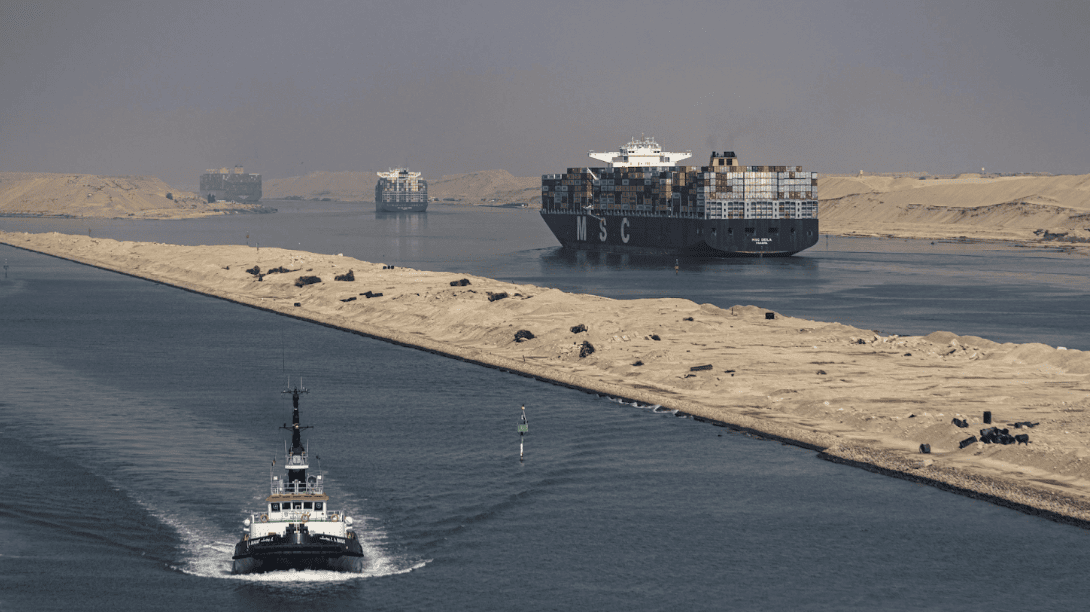In 1898, the British journalist G. W. Steevens described his experiences with the Suez Canal: “I did see the famous Canal… Never, I suppose, has any single work of man upset the balance of the world like the Suez Canal; it has made and unmade men, cities, nations. But to look at, it is just a narrow ditch cut through a sheer wilderness of sand.” Today the Suez Canal seems to again be upsetting the “balance of the world.” Since November 2023, the Houthi militia (a group of Iran-backed rebels in Yemen) have been firing missiles and drones towards ships in the Red Sea, which the Suez Canal empties into, in protest against the continued US support of the Israeli war against Palestinians. This has led to a decrease of trade through the Suez Canal, with economic repercussions throughout the world as ships try to avoid passing through.
The Houthis, which currently control Northwestern Yemen, were founded with the goal of reviving the Zaidi branch of Shia Islam. The group grew in the early 2000s and, under the direction of Hussein al-Houthi, directly challenged the ruling US-backed government in Yemen. From the beginning of its rise, the group sought to end foreign influence in their country. Slogans such as “Death to America,” “Death to Israel, and “a curse upon the Jews” were adopted by the group, representing their strong anti-American and anti-Israel stances.
The Houthis have been able to gain symbolic power in the Middle East, and worldwide, thanks to a double campaign of propaganda and increasing military strength. For example, in 2012, the Houthis founded a television channel called Al-Masirah where they continue to spread their values to viewers. Similarly, after hijacking a ship, the Houthis created a music video called “Axis of Jihad,” proclaiming that the Houthis “shall not be defeated.” The conflict in the Red Sea has exposed a greater number of people than ever before to the messages and propaganda of the Houthis. They have gained supporters on every continent as people express increasing frustration with the war in Gaza and the response by the United States.
Their unconventional military tactics have made them a difficult enemy to combat. Rather than staying in one place or storing weapons in a central location, the fighters move constantly. By practicing this form of “irregular warfare” the Houthis have been able to avoid significant damage. The Houthis have maintained a 75 percent capacity to launch weapons at ships in the Red Sea, despite the US airstrikes “destroying around 90 percent of the targets struck.” In other words, although the US has successfully hit the majority of its targets, the Houthis have been able to evade mass damage by refusing to stay in one place. The militia has also been able to acquire a diverse range of weapons, helped in part by their Iranian backers. Further illustration of their growing arsenal, the group has been able to develop radars using readily available and portable commercial systems, which the United States Marine Corps has been trying to copy. These radars are similar to the type that any person can buy, and are therefore much more portable than the more complex systems used in the US military. The combination of their evasive tactics, supply of weaponry, and increasing global support has made the Houthis a difficult target.
Yet the incentives to stop the Houthis from attacking ships are enormous due to the economic importance of the Suez Canal and the Red Sea. The United Nations Conference on Trade and Development (UNCTAD) has estimated that trade volume through the Suez Canal has decreased by 42 percent in the past two months. This amounts to a significant disruption, considering that in 2023, between 12 and 15 percent of global trade went through the Suez Canal.
Securing the free flow of trade and goods has been one of the principal justifications for American and British strikes against the Houthis. Over the past few months, the Houthis attacks have sent a ripple effect through the shipping industry. Many ships have decided to steer clear the Suez Canal, leading to tens of extra days of travel, which in turn increases fuel use and costs. Shipping companies have responded by raising prices and taking out higher insurance premiums, resulting in costs being passed on to consumers and threatening the return of high inflation.
The current sea transport networks are founded on an assumption of stability and an uninhibited flow of goods. Yet, shipping may be becoming increasingly unreliable, especially if global hegemonic powers remain unable to counter the unconventional tactics used by the Houthis militias.
The effects of the instability have extended across the world through our interconnected economic systems. The economic ties that have allowed us to increase our consumption, are paradoxically the same reason that the Houthis have been able to seize so much power over shipping. The Houthis have risen to be a powerful force in the Middle East, becoming a symbol of power against US domination and exposing the fragility of the shipping industry.
Other posts that may interest you:
- Local Victories for Turkish Opposition — A Sign of Hope?
- Are France and Japan a Mismatch Made in Heaven?
- Mes yeux sont comme cette île
- A Reflection on Dark Tourism
- Cadavre Exquis : Goodbye stranger
Discover more from The Sundial Press
Subscribe to get the latest posts sent to your email.






